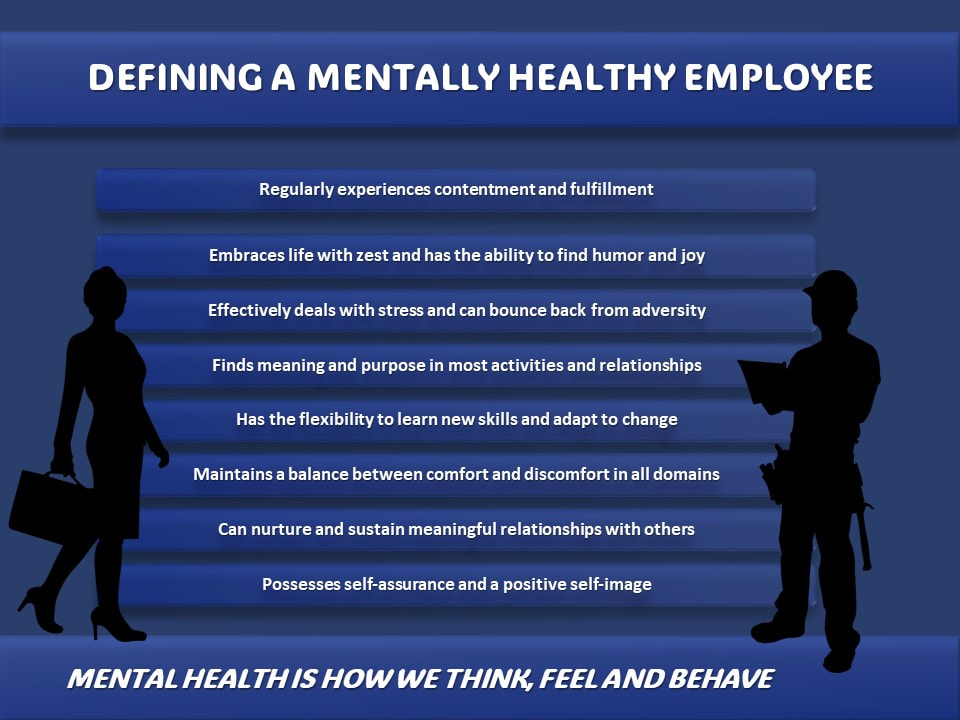PREVENTION IS MORE EFFECTIVE THAN INTERVENTIONIn the context of workplace mental health, prioritizing prevention over intervention is a strategic and cost-effective approach. Before implementing any preventative plan, developing clear goals is a must because without understanding what you are trying to achieve it is difficult to develop success metrics.
Workplace mental health should move beyond the conventional paradigm of benefit coverage supplying well-supported medical interventions delivered post-crisis or the questionable impact of generic wellness perks. Instead, the focus should shift towards targeted mental health support that helps employees become their best selves. Only when individuals are in their optimal state can they contribute their best to the organization. By defining a mentally healthy individual within the workplace, organizations set the stage for the implementation of effective preventative measures, such as stress management programs and mental health education initiatives. This emphasis on prevention not only alleviates the financial burden associated with reactive interventions but also cultivates a workplace culture that values well-being, fostering a more productive and engaged workforce. Ultimately, the journey toward optimal workplace mental health involves a shift from reactive measures to proactive strategies, ensuring employees are supported in becoming their best for the benefit of the organization.
0 Comments
A CORPORATE DILEMMA
In today's corporate landscape, the focus on employee well-being has gained considerable traction. Companies are increasingly recognizing the importance of mental health support but haven't looked at the criteria used to drive most company purchases, particularly when it comes to accountability, budgets and purchasing parameters. Companies are designed as problem-solvers, usually the problems include increasing production and profitability or minimizing bottlenecks and pain points. Preventative mental health support will often be discussed in company mission statements under some employee-centric terminology but it rarely translates to a budget line item, or a director in charge, or even a diagnosed ongoing pain point. Companies are highly skilled at tackling identified problems or achieving defined goals with clear metrics but workplace Mental Health? It's more like a silent ninja - causing trouble in the background without any big red flags. The problems that often arise tend to be deteriorating relationships or behavioral problems like absenteeism, presenteeism, lack of engagement and stress which usually gets blamed on the employee rather than their mental health. Mental Health is always going to be an unidentified future problem, lurking in the shadows, until it's too late to avert. Preventative Mental health support won't slide seamlessly into spreadsheet formulas, nor can it promise immediate savings or profit spikes. It can't be shuffled aside under wellness initiatives or self-care programs. It won't deliver tangible ROI's or satisfy a cost-benefit analysis because you can't measure the value of a mentally healthy employee. Preventative strategies are an investment in something intangible and while we all understand that you don't pay attention to your health... until you lose it, we are even less aware of the health of those around us. Your benefits package is not focused on health it is an organizational insurance policy for when employees break. Waiting until your employees have symptoms is a remarkably ineffective way of keeping them safe. It is usually best practice for companies to have comprehensive preventative maintenance on all of their expensive and/or high use valued assets but rarely do they even assign a budget to workplace mental health. If you have no budget, no personnel and no metrics, then you do not have workplace mental health as a priority. The few companies that do choose to invest in preventative mental health support are pioneers. They are saying, "We do care for our employees, We are not just here for the quick wins, we are in it for the long haul." They are declaring that employee mental health matters as much as their bottom line. So, while it might not check all the boxes on the typical corporate shopping list, investing in mental health support is setting the stage for a workplace where people don't just survive; they thrive. And in the high-stakes world of business, that's the kind of investment that pays dividends in loyalty, dedication, and a workforce that's not just present but truly engaged. |
AuthorI am an easy going, slightly disagreeable, usually funny but always understanding mental health expert. I will be very straight with you, without judgment. More importantly, I promise to care about you and the process. ArchivesCategories |


 RSS Feed
RSS Feed